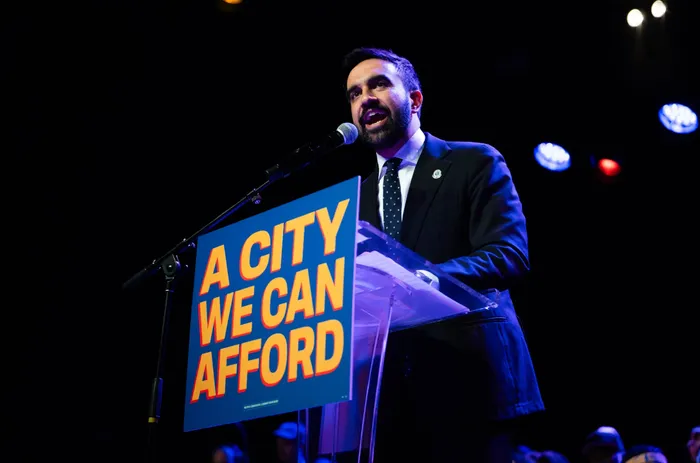
New York Mayoral candidate Zohran Mamdani's could reignite hope and transform local governance in a country in which Islamophobia is rife.
Image: Madison Stewart / Zohran Mamdani Website
Zaid Jilani
When I found out about New York Democratic Assembly member Zohran Mamdani’s upset victory in New York City’s mayoral Democratic primary, an old memory popped into my head.
It was the day after Barack Obama trounced John McCain in 2008’s presidential election. A friend of mine who was running his student chapter for the state of Georgia greeted me at the student center of the University of Georgia, where we both went to school.
His face was gleaming. He was the son of Liberian immigrants, and Obama’s victory had special resonance for him. America - the same country built off the backs of enslaved Africans - was capable of electing a Black man.
“Now you could be elected president,” I told him.
Not missing a beat, he replied, “Now you could!”
Let’s not get carried away, I thought.
This was still the United States of America. Seven years earlier, a group of fanatics who committed the 9/11 attacks had made Muslim Americans such as me synonymous with terrorism in the eyes of millions. Heck, Obama had to swear up and down over and over that he wasn’t Muslim just to get elected.
And, in my years working in and around politics since then, my cynicism about this was unchanged. Recall that then-Minnesota Democratic Rep. Keith Ellison - the first Muslim elected to Congress - had to prove to a CNN host that he wasn’t “working with our enemies.” Then Ellison’s bid to run the Democratic Party was derailed nine years later in part because of a handful of critical comments he had made about Israel’s treatment of the Palestinians. This came only months after Donald Trump was elected in part on a promise to ban Muslims from entering the United States entirely.
Just like our parents had slapped American flags on everything they owned after 9/11, Muslim American politicians and staffers across Capitol Hill and Washington more broadly were counseled to always demonstrate our patriotism first and foremost because it was constantly being questioned by everyone around us.
When I worked at progressive think tanks or left-wing political action committees, my superiors were terrified of coming across as too sympathetic to Muslim American concerns about the Middle East or American foreign policy more broadly. They didn’t want to get called antisemitic or be accused of sympathizing with terrorists.
The war in Gaza compounded this sense of feeling besieged. Two presidents in a row have signed up to support what appears to be an endless war against Palestinian sovereignty itself, going far beyond what was necessary to defend against Hamas militancy. As they watched tens of thousands of civilians killed on their TV screens and social media feeds by a military backed to the hilt by American taxpayer support, many Muslims I knew felt like the country had accepted these Palestinian deaths so easily because America simply will never allow Muslims to be coequals.
But Mamdani’s victory set off a vibe shift among my Muslim friends, family and colleagues like nothing I’ve ever seen before.
People I know who believed that America would never accept Muslims for who they were now believe that anything is possible. Maybe my friend at UGA all those years ago wasn’t wrong. Maybe there could be a Muslim president in my lifetime.
In that sense, Mamdani’s victory is an Obama moment for us.
A young and principled Muslim faced off with the beating heart of the local Democratic establishment, which held nothing back as it sought to tar him as an antisemitic extremist. There is no more politically inflammatory charge in New York, which has the largest Jewish population of any city in America.
And yet not only did he win, he won handily. By breaking this glass ceiling, Mamdani restored faith in the American experiment among millions of American Muslims.
The way he did it mattered, too: Watching Mamdani run what was essentially a joint ticket with Comptroller Brad Lander, a Jewish progressive, I saw a vision of mutual respect and admiration across cultural lines that felt like the best of America.
That it happened in the same city targeted on 9/11 made it all the more poignant as well. The national trauma that defined American life in my childhood did not have to define it in my future. If New Yorkers could give Mamdani a chance, they could give the rest of us one, too.
None of this is to say that I endorse the idea of voting for someone just because they share your faith or ethnicity. I agree with then-Sen. John F. Kennedy, who said in 1960: “I want no votes solely on account of my religion.”
I think people should vote for the best candidate based on their experience, values and ideas - not based on religious or ethnic tribalism. I worry that Mamdani’s relative inexperience could be an issue as he is likely set to govern America’s most populated city, and some of his ideas might be too radical. Scrutinizing him on these grounds is warranted.
But I also want to live in a country where a Muslim candidate for office will be scrutinized based on their record, not their religion. And with Mamdani’s victory on Tuesday, America showed Muslim Americans that despite all our cynicism over the past 20 years, this continues to be the best country in the world for minorities - a place where prejudices cannot and will not hold back progress.